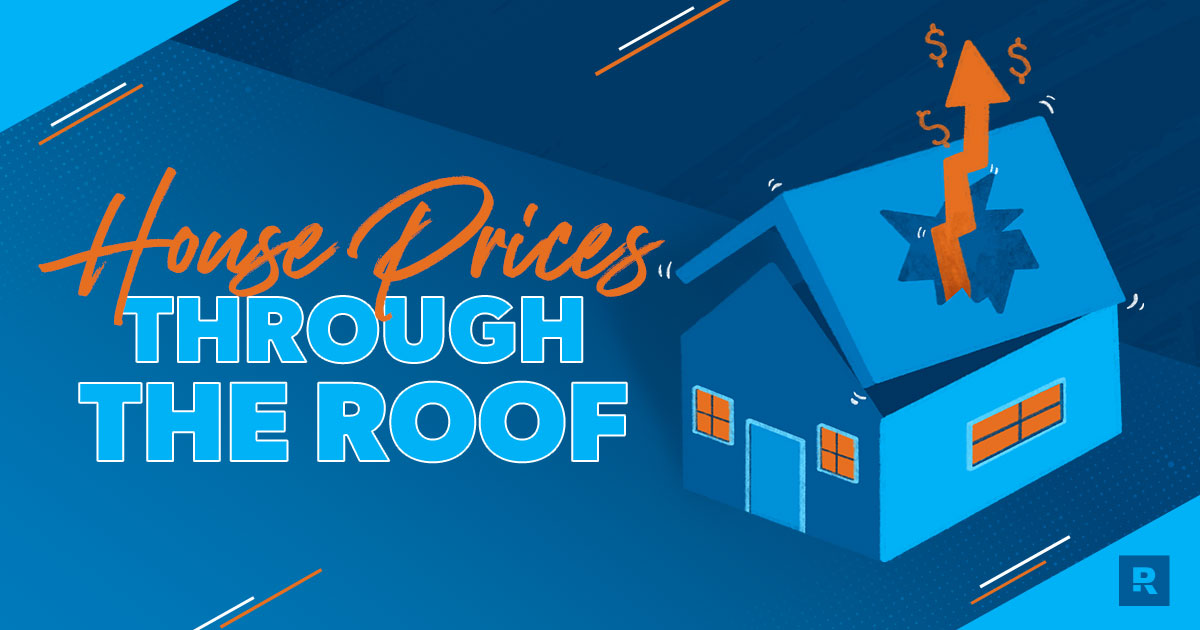How to Navigate a Hot Housing Market: For Buyers and Sellers
10 Min Read | Feb 29, 2024

Hot housing markets can cause buyers to do some pretty crazy things to try to get the house they want. Things like making an offer on a house without ever stepping foot in it. Or getting in a bidding war and paying way over asking price. We saw a lot of that kind of craziness back in 2020 and 2021.
A hot housing market is a great time to be a seller . . . well, that is, until you have to go find a place, swap roles, and become the buyer too. Here are some tips to keep your cool in a hot market.
What Is a Hot Housing Market?
What does “hot housing market” even mean? A hot housing market happens when there are more buyers than houses for sale—in other words, the demand is high and the supply is low. This causes prices to go up. Remember that from economics class?
Sellers in a hot housing market usually can sell their home fast and get a pretty penny for it. For buyers, on the other hand, things are less rainbows and butterflies. Buyers often find themselves paying more and getting less home for their money in a hot housing market.
The real estate market can be hot or cold. It’s always changing. Sure, it can be pretty predictable at times, and that lets us anticipate certain trends, but there are also big shifts that can cause the market to take a whole new course for months or even years.
With the right agent, taking on the housing market can be easy.
Buy or sell your home with an agent the Ramsey team trusts.
What Causes a Hot Housing Market?
The hot housing market a couple of years ago had a lot to do with COVID-19. But it wasn’t really the pandemic itself that caused all the trouble. It was the effects of the pandemic. Here are a few of the ways the housing market got turned on its head and became a feeding frenzy for buyers.
Supply Problems
During the pandemic, construction of new homes came to a standstill because of government-mandated shutdowns. And the price of building supplies, like lumber, also went through the roof due to supply chain problems, which made new homes even more expensive. With the supply (or inventory) of new and existing homes for sale at record lows, buyers drove prices up.1 As people got more desperate to find a house, they paid higher and higher prices to get one.
Mass Exodus From Metro Areas
During the pandemic, working from home became a way of life for many people. The rise of remote work had two effects on buyer demand. First, people who spent all day at home decided they wanted to buy a new home with more living space. And second, remote work allowed them to move from their crowded, overpriced city home to a bigger (and cheaper) home in a suburb—or even another state with benefits like lower taxes or fewer COVID restrictions. This increased demand caused the market to heat up.
Low Interest Rates
And let’s not forget about mortgage interest rates. During the pandemic, the Fed dropped interest rates to close to 0%, which caused the average interest rate for a conventional 15-year fixed-rate mortgage (the cheapest type of mortgage and the only kind we recommend) to fall below 2.25%!2 These low rates allowed home buyers to borrow more money for homes—which then led to more demand and higher prices.
How to Navigate a Hot Housing Market
What Does It Mean for Sellers?
Because there are more buyers than sellers in a hot housing market, competition is fierce and inventory is . . . not so fierce. Many listings, especially those in the more affordable price range, go fast. If you’re a seller in a hot housing market, you have a really strong advantage. You’re able to sit back and look at a lot of offers and pick the best one.
Find expert agents to help you buy your home.
But hot market or not, before you put up the For Sale sign and load your Tahoe with moving boxes, make sure you’re really financially (and emotionally) ready to sell. Then, if the green lights are flashing, the next step is to get with your agent and prepare for these common things:
- Are you selling and buying? Sell your home first before you buy. Remember, with low inventory, it may take longer to find a new home than to sell your current one. And you definitely don’t want to be stuck paying two mortgages at the same time. As awesome as it’s going to be to sell your place and pocket all that extra cash, just remember that you’ll soon be in the buyer’s shoes looking for a new place. That means you’ll feel all those headaches that come with being the buyer.
- Make all the options work in your favor. Need to buy and sell on the same day? Want to rent back the home after it sells? In a hot housing market, buyers are more likely to accept your terms. Take advantage of it!
- Have a multiple-offer game plan. Get on the same page with your agent on price, type of financing, and contingencies so that you pick the best offer.
- Make sure you have enough insurance coverage for your current home’s increased value. As long as you’re still in your current home sweet home, it’s a good idea to make sure your homeowner’s coverage amount is still enough to cover the new rise in your home’s value.
What Does It Mean for Buyers?
Just because it’s a seller’s market doesn’t mean buyers can’t come out on top too. But you’re going to need to have a seasoned pro real estate agent in your corner. Between the low inventory of houses, crazy competitive offers, and homes going for way over their asking price—you’re going to need a top-notch agent to be your guide in a hot market.
To win in a seller’s market, buyers need to keep these things in mind:
- Think about your time frame. Buying a house is a long-term investment. If you don’t plan to stay in a home at least three years, you may want to rethink buying it—especially in a hot housing market.
- Know what it takes to have a competitive offer. If you’re going the mortgage loan route, then be sure to get preapproved (not just prequalified) for a conventional loan.
- Make a cash offer (if you saved for it). If you’ve been saving all this time to make a cash offer, even better! Cash is king, and it’ll set you apart from other buyers out there. In a hot housing market, you need anything and everything that can inch you past another offer. And if you’re coming in with an all-cash offer—that’s sure to get plenty of attention.
- Stick to the budget. Sure, it’s tempting to beef up your offer and blow your budget—especially if you love the house and feel like you need to act now. But don’t let emotion and a time crunch cause you to make a bad money decision. A lot of buyers get swept up in that—in 2021, 1 in 5 first-time home buyers offered more than their budget allowed, and nearly 15% totally waived contingencies (like a home inspection).3
- Be prepared for a longer house hunt. As much as you want to land a house, you might have to come to terms with waiting a while—especially if you’re a first-time home buyer. About 20% of first-time home buyers spent more than a year searching for their home.4
- Know when to walk away. If you keep getting outbid, think you’ll have to settle for a home you don’t want, or feel pressured to go over budget, then it might be better to let things cool off a little. Waiting another six months to a year might feel like an eternity, but it can do a lot for letting a hot housing market settle down.
Bonus: You’ll be able to keep adding to your down payment, and maybe you’ll even nab a raise at work—which will all put you in a better position when you do buy.
How to Win a Bidding War
So—for better or for worse—you’ve gotten into a bidding war. Your offer might get the seller’s attention if it’s the highest on the table or if it comes with the least amount of hoops to jump through (contingencies). Here are some ways to make your bid look even better:
- Offer to top the highest bid by $1,000 up to a certain amount. This way, you’re less likely to be outbid by anyone.
- Make a cash offer. This makes your closing costs lower and brings closing day faster—which is probably what the seller wants if they’re trying to buy another home at the same time.
- Increase the amount of your down payment or the earnest money percentage.
- Remind the seller why you love their home. If you already sent a handwritten letter, point back to that! People like to think their cherished home is going to be loved and enjoyed by the next homeowner too.
- If you’ve been preapproved for a mortgage, say it again. That way, the seller knows there’s less of a chance that your financing might fall through at the last minute.
- Definitely resist the urge to contact the seller yourself. Don’t be creepy here. They’re probably under a lot of stress, and you might make things a lot worse. It’s best to let your agent make your case to their agent.
What Causes a Hot Housing Market to Cool Down?
We said it earlier, but it bears repeating: The real estate market is always changing. Here are a few factors that can cool off a hot housing market. The bad news? The things that could pour water on the market aren’t very good things.
Inflation
Our latest hot real estate market was cooled by record-high inflation that hit 9.1% in June of 2022.5 Inflation causes the cost of everything to go up. And when people have trouble buying basic necessities, they’re less likely to buy a house.
Rising Interest Rates
When interest rates increase (as they have the last couple of years), home buyers freeze like a deer in headlights. The Fed started raising interest rates to combat inflation in March of 2022, and mortgage rates followed suit and topped 7% in November of 2023.6
Take Control of the Market With a Trusted Pro
Whether you’re buying or selling a home in a hot or cold market, you need a real estate pro on your side. Don’t go it alone. You need an expert agent who knows the area, knows the way the market is looking, and knows how to use that to your advantage. They can help you save more money or make more money—whether you’re buying or selling.
Our RamseyTrusted agents are top-performing professionals in your market who’ve earned our trust by actually caring about your financial goals. They’ve weathered the market’s storms and are the only pros we recommend to help you make your next move. Make sure you have a pro in your corner.
Next Steps
- Take our free quiz to make sure you’re ready to buy a house.
- Interview at least three local RamseyTrusted agents.
- Choose the agent who’s right for you.


